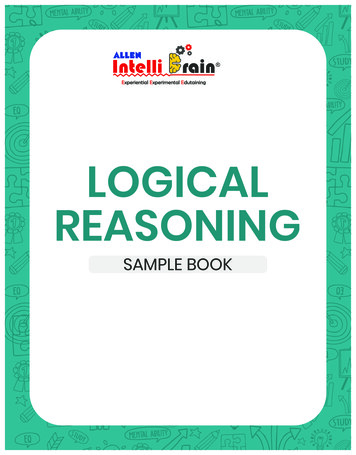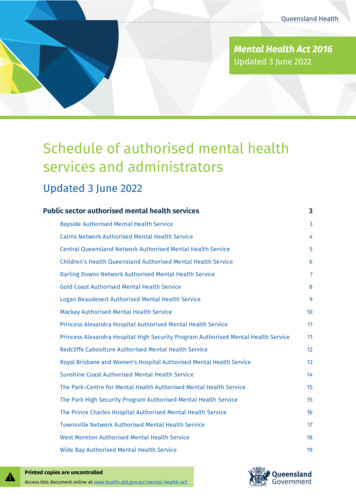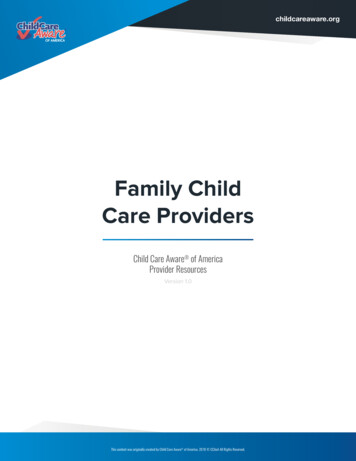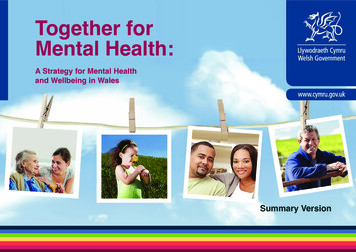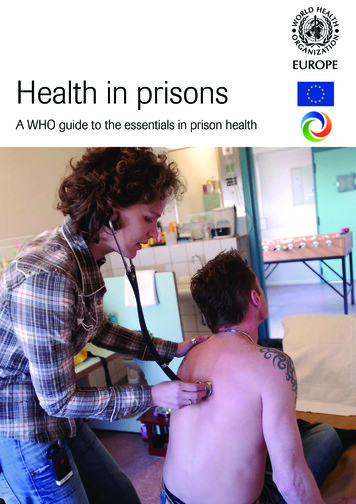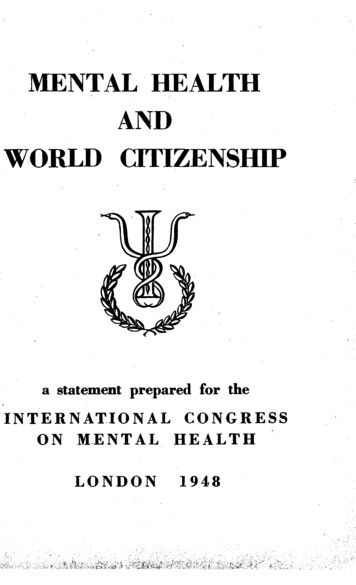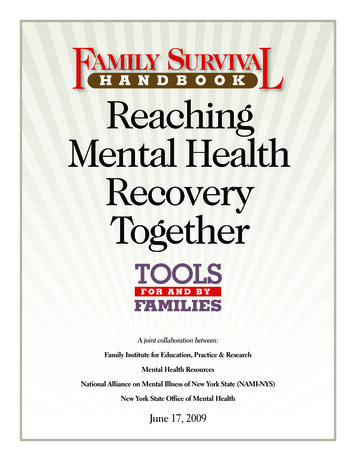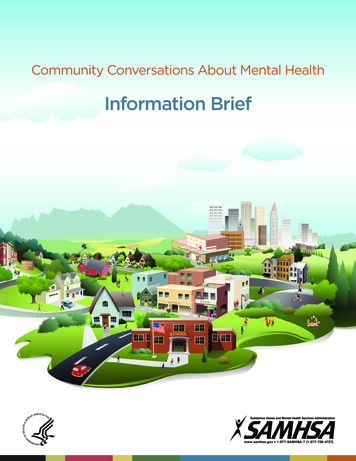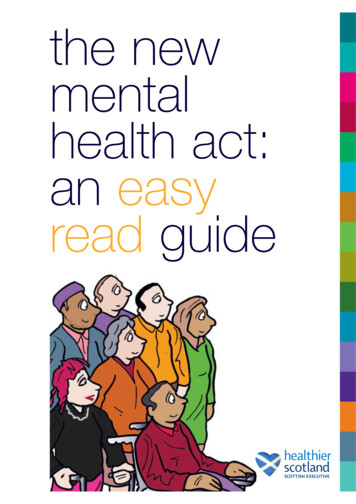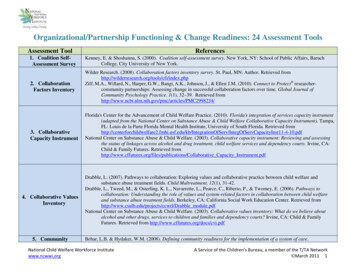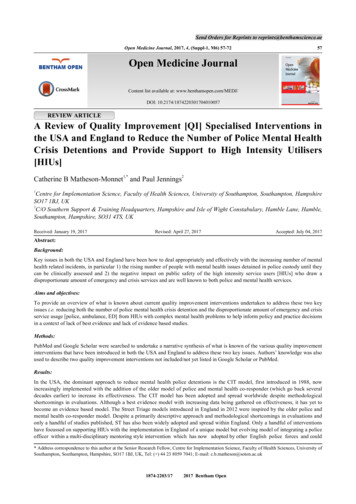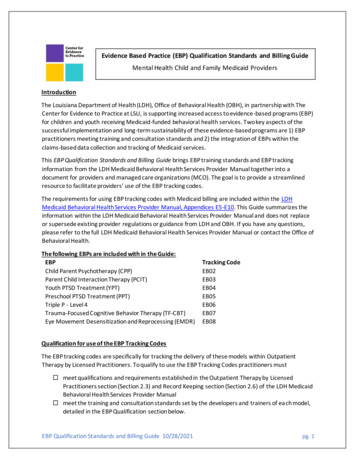
Transcription
Evidence Based Practice (EBP) Qualification Standards and Billing GuideMental Health Child and Family Medicaid ProvidersIntroductionThe Louisiana Department of Health (LDH), Office of Behavioral Health (OBH), in partnership with TheCenter for Evidence to Practice at LSU, is supporting increased access to evidence-based programs (EBP)for children and youth receiving Medicaid-funded behavioral health services. Two key aspects of thesuccessful implementation and long-term sustainability of these evidence-based programs are 1) EBPpractitioners meeting training and consultation standards and 2) the integration of EBPs within theclaims-based data collection and tracking of Medicaid services.This EBP Qualification Standards and Billing Guide brings EBP training standards and EBP trackinginformation from the LDH Medicaid Behavioral Health Services Provider Manual together into adocument for providers and managed care organizations (MCO). The goal is to provide a streamlinedresource to facilitate providers’ use of the EBP tracking codes.The requirements for using EBP tracking codes with Medicaid billing are included within the LDHMedicaid Behavioral Health Services Provider Manual, Appendices E5-E10. This Guide summarizes theinformation within the LDH Medicaid Behavioral Health Services Provider Manual and does not replaceor supersede existing provider regulations or guidance from LDH and OBH. If you have any questions,please refer to the full LDH Medicaid Behavioral Health Services Provider Manual or contact the Office ofBehavioral Health.The following EBPs are included with in the Guide:EBPChild Parent Psychotherapy (CPP)Parent Child Interaction Therapy (PCIT)Youth PTSD Treatment (YPT)Preschool PTSD Treatment (PPT)Triple P - Level 4Trauma-Focused Cognitive Behavior Therapy (TF-CBT)Eye Movement Desensitization and Reprocessing (EMDR)Tracking CodeEB02EB03EB04EB05EB06EB07EB08Qualification for use of the EBP Tracking CodesThe EBP tracking codes are specifically for tracking the delivery of these models within OutpatientTherapy by Licensed Practitioners. To qualify to use the EBP Tracking Codes practitioners must meet qualifications and requirements established in the Outpatient Therapy by LicensedPractitioners section (Section 2.3) and Record Keeping section (Section 2.6) of the LDH MedicaidBehavioral Health Services Provider Manual meet the training and consultation standards set by the developers and trainers of each model,detailed in the EBP Qualification section below.EBP Qualification Standards and Billing Guide 10/28/2021pg. 1
submit documentation to each MCO of meeting EBP model qualification standards as part ofcredentialing with the MCO (see APPENDIX A for a list of contacts at each MCO).EBP Qualification StandardsBelow you will find the qualification standards for each EBP model and the documentation thatpractitioners can present as proof of meeting the qualification standards. For EBPS that have official listsof EBP Practitioners, inclusion on those lists OR official certificates documenting meeting the EBPQualification standards may be used. Please note, these EBP Practitioner lists may not be complete orup to date, therefore completion of the EBP Standard may be verified using the documentation listedbelow. Additional information about the training requirements to achieve the qualification standardsare available in the LDH Medicaid Behavioral Health Services Provider Manual and the EBP developers’and trainers’ websites (APPENDIX B).Child Parent Psychotherapy (CPP) – Tracking Code EB02 Qualification StandardRostered as a trained CPP therapists by UCSF Child Trauma Research ProgramQualification DocumentationCertificate in Child Parent Psychotherapy issued by the Child Trauma Research Programat UCSF OR inclusion on the CPP Provider RosterAdditional InformationCPP trainers issue the certificate upon completion of the training and consultationrequirements for rostering. Therapists should contact their CPP trainers for a copy ofthe certificate, if needed. Rostered therapists may be included on the CPP ProviderRoster website https://childtrauma.ucsf.edu/cpp-provider-roster; however, this list isnot comprehensive and a rostered therapist may elect to not be included on the list.Parent Child Interaction Therapy (PCIT) – Tracking Code EB03Qualification StandardCertified in Parent Child Interaction Therapy by PCIT InternationalQualification DocumentationCertificate issued by PCIT International OR inclusion in the PCIT International list ofCertified PCIT TherapistsAdditional InformationAfter completing training and consultation that meets PCIT International trainingstandards, PCIT practitioners must submit an application to PCIT International andcomplete a PCIT exam to achieve certification. PCIT International maintains a list of PCITCertified Therapists at http://www.pcit.org/certified-therapists.htmlEBP Qualification Standards and Billing Guide 10/28/2021pg. 2
PCIT International requires therapists to re-new their certification every 2 years bysubmitting an application with documentation of the therapist completing a requirednumber of PCIT Continuing Education credits.Youth PTSD Treatment (YPT) – Tracking Code EB04 Preschool PTSD Treatment (PPT) –Tracking Code EB05Qualification Standard“Advanced Training” certificate in Youth PTSD Treatment, or Preschool PTSD TreatmentQualification DocumentationCertificates of Completion of Advanced Training in Youth PTSD Treatment and/orPreschool PTSD Treatment issued by Tulane University School of Medicine OR inclusionon the registry of PPT / YPT certified providers having completed Advanced Training.Additional InformationThe YPT / PPT trainer issues the certificate up completion of the training andconsultation requirements for Advanced Training and maintains a registry of all certifiedproviders e P - Level 4 – Tracking Code EB06Qualification StandardAccreditation by Triple P America (TPA)Qualification DocumentationDocumentation issued by Triple P America of accreditation in Triple P- Standard Level 4.Additional InformationTriple P America does not maintain a public directory of accredited providers. Triple PAmerica does issue documentation of accreditation to the individual provider.Trauma-Focused Cognitive Behavior Therapy (TF-CBT) – Tracking Code EB07Qualification StandardTF-CBT Certification by the TF-CBT Therapist Certification ProgramQualification DocumentationCertificate issued by the TF-CBT National Therapist Certification Program OR inclusion inthe TF-CBT Therapist Certification Program listEBP Qualification Standards and Billing Guide 10/28/2021pg. 3
Additional InformationAfter completing training and consultation that meets TF-CBT Therapist CertificationProgram training standards, TF-CBT practitioners must submit an application to theTFCBT Therapist Certification Program and complete a TF-CBT knowledge-based test toachieve certification. The TF-CBT Therapist Certification Program maintains a list ofCertified TF-CBT Therapists at https://tfcbt.org/therapists/TF-CBT Therapist must be re-certified every 5 years by completing an application andonline recertification training modules.Eye Movement Desensitization and Reprocessing (EMDR) Therapy– Tracking Code EB08Qualification Standard - Basic TrainedCompletion of an EMDR International Association (EMDRIA) Approved Basic Training(including a minimum of 20 hours instructional material, 20 hours supervised practicum,10 hours consultation)ORCertificationEMDR Certified Therapist through the EMDR International Association (EMDRIA).Qualification DocumentationCertificate of completion of an EMDRIA-Approved EMDR Therapy Basic Training Courseissued by an EMDRA-Approved Trainer OR EMDR Certification issued by EMDRIAAdditional InformationProof of completion of an EMDRIA-approved basic training course is the standard forpracticing EMDR. EMDR Certification is an advanced level of preparation that is alsoaccepted but not required. Practitioners that choose to become EMDR Certified willcomplete additional training and consultation and will re-certify every two years.EMDRIA maintains a membership list at https://www.emdria.org/find-an-emdr-therapist/ of clinicianswho have completed an EMDRIA-approved basic training course, as well as clinicians who havecompleted the more advanced level of EMDR certification. In addition, EMDRIA records dates ofcompleted basic training and the name of the EMDRIA trainer in their database. The information may beretrieved by sending an email request to info@emdria.org or call 1 512-451-5200.Clinicians who do not maintain an annual EMDRIA membership and so are not listed in the EMDRIAdirectory, can instead verify their qualifications with documentation of completion of anEMDRIAapproved basic training course.EBP Qualification Standards and Billing Guide 10/28/2021pg. 4
Use of the EBP Tracking CodesPractitioners bill standard CPT individual and family therapy codes for sessions providing the EBP anduse the EBP tracking codes (listed above) with claims to note that the therapy session utilized the EBPmodel.Additional EBP GuidanceAuthorizationIf MCO policy requires prior authorization for Outpatient Therapy by Licensed Providers, the EBPs mayhave effective treatment durations that exceed the initial authorization level of benefit. In that casereauthorization should be requested indicating that the specialty EBP model is being utilized andservices appropriately may exceed the initial authorization and should be authorized for continuingservices to complete the medically necessary treatment episode and provide evidence-based care to theyouth and family. Additional information about standard treatment duration for each of the EBPs canbe found in the LDH Medicaid Behavioral Health Services Provider Manual, Appendix EEBP Quality AssuranceEBP practitioners are expected to keep documentation of providing services consistent with the EBPmodel, as outlined in their training process, within the client records in accordance with Record Keepingsection (Section 2.6) of the LDH Medicaid Behavioral Health Services Provider Manual. Additionalguidance on EBP documentation, fidelity and measures can be found can be found in the LDH MedicaidBehavioral Health Services Provider Manual, Appendix E.APPENDIXA. MCO Contact ListB. EBP Training and Certification Requirements ResourcesAppendix AMCO Contact ListAppendix AContact Name and TitleAetna BetterHealthAetna BetterHealthAetna BetterHealthAetna BetterHealthEmailChenise Taylor, LPC, EBPtaylorc10@aetna.comLiaisonKelly Gay, LPC,Behavioral Health Lead gayk@aetna.comTiffanie Lemonds, SeniorNetwork Managerlemondst@aetna.comZiesha Every, LPC-S,Behavioral Healtheveryz@cvshealth.comUtilization ManagerEBP Qualification Standards and Billing Guide 8959-299-6414pg. 5
Appendix BResources on the Training and Consultation Requirements for EBP PractitionersEBPWebsiteChild Parent Psychotherapy s/training/lc/Parent Child Interaction Therapy tmlYouth PTSD Treatment reschool PTSD Treatment riple P - Level ttps://tfcbt.org/certification/Trauma-Focused Cognitive BehaviorTherapy (TF-CBT)Eye Movement Desensitization andReprocessing n/emdrtraining/ OR certification-2/EBP Qualification Standards and Billing Guide 10/28/2021pg. 6
Center for Evidence to Practice at LSU, is supporting increased access to evidence-based programs (EBP) for children and youth receiving Medicaid-funded behavioral health services. Two key aspects of the successful implementation and long-term sustainability of these evidence-based programs are 1) EBP
